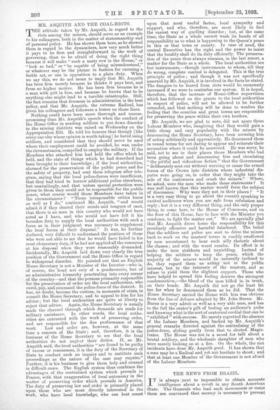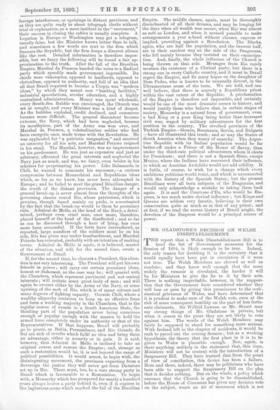THE NEWS FROM BRAZIL.
IT is always ',next to impossible to obtain accurate intelligence about a revolt in any South American State. The Generals who lead such movements or resist them are convinced that secrecy is necessary to prevent foreign interference, or uprisings in distant provinces, and as they are quite ready to shoot telegraph clerks without trial or explanation, as a mere incident in the " movement," their success in closing the cables is usually complete. A Legation in Europe or Washington may get a telegram, usually false, but the Minister knows better than to talk, and sometimes a few words are sent to the firm which finances the Republic, but the firm keeps a discreet silence like the rest. Detailed information is therefore impos- sible, but we fancy the following will be found a fair ap- proximation to the truth. After the fall of the Brazilian Empire, Marshal da Fonseca handed the reins to a Radical party which speedily made government impossible. Its chiefs were visionaries, opposed to landlords, opposed to clericalism, opposed to authority, and full of an idea that all that Brazil required to become a Utopia was "modern ideas," by which they meant new "banking facilities," industrial speculations, secular education, and a highly centralised administration. Money was spent wholesale, every South-Sea Bubble was encouraged, the Church was set at nought, and every Minister was a kind of despot. As the bubbles exploded, credit declined, and commerce became more difficult. The general discontent became extreme, the Navy, which had been neglected, became its mouthpiece, part of the Army was won over, and Marshal da Fonseca, a valetudinarian soldier who had been energetic once, made terms with the Revolution. He was applauded for "a patriotic resignation," and received an amnesty for all his acts, and Marshal Peixoto reigned in his stead. The Marshal, however, was no improvement on his predecessor. He was just as expensive and just as arbitrary, affronted the great interests and neglected the Navy just as much, and was, we fancy, even bolder in his schemes for perpetuating his power. Like Balmaceda, in Chili, he wanted to nominate his successor,—a curious compromise between Monarchical and Republican ideas which, so far as we know, has never been attempted in Europe ; and he failed to meet the grand Brazilian danger, the revolt of the distant provinces. The danger of a general break-up is never absent from the thoughts of the governing classes round Rio, whose patriotism, which is genuine, though based mainly on pride, is accentuated by the fact that the break-up would to them be pecuniary ruin. Admiral de Mello, at the head of the Navy, a deter- mined, perhaps even cruel man, once more, therefore, placed himself at the bead of the disaffected ; and so far as Can be discerned through a haze of lying, has once more been successful. If the forts have surrendered, as reported, large numbers of the soldiers must be on his side, Rio has given way under bombardment, and Marshal Peixoto has retreated, probably with an intention of making terms. Admiral de Mello is again, it is believed, master of the situation, and will, for the second time, create a Government of Brazil.
If, for the second time, he chooses a President, this situa- tion is not very interesting. The President will put his own friends in power ; will carry out certain pecuniary ideas, honest or dishonest, as the case may be ; will quarrel with the Chambers, which represent provincial and not central interests ; will irritate some great body of men ; and will again be overset either by the Army or the Navy, or some uprising of the mob of Rio, which is of many colours and many degrees of fighting capacity. Outside Chili, where a wealthy oligarchy contrives to keep up an effective force and form a working majority in the Chambers, that is the regular course of events in a South American • State, the thinking part of the population never being numerous enough or popular enough with the masses to hold the armed force completely under its authority or that of the Representatives. If that happens, Brazil will probably go to pieces, as Bahia, Pernambuco, and Rio Grande do Sul are sick of revolts which fulfil no idea and bring them no advantage, either in security or in gain. It is said, however, that Admiral de Mello is inclined to take an original course and restore the Empire; and, strange as such a restoration would be, it is not beyond the range of political possibilities. It would arrest, to begin with, the disintegrating movement, the provinces expecting from a Sovereign the justice they will never get from Dictators set up in Rio. There must, too, be a very strong party in Brazil which is favourable to a Restoration. To begin with, a Monarchy which has prospered for nearly a hundred years always leaves a party behind it, even if it expires in the inglorious scene which marked the fall of the Brazilian Empire. The middle classes, again, must be thoroughly disenchanted of all their dreams, and may be longing for the days when all wealth was secure, when Rio was almost as safe as London, and when it seemed possible to make arrangements a year a-head without clauses, express or implied, providing against a Revolution. The Blacks, again, who are half the population, and the bravest half, are in their careless way on the side of the Braganzas, who fell mainly because they insisted on their emancipa- tion. And, finally, the whole influence of the Church is being thrown on that aide. Messages from Rio rarely mention the existence of a Clerical party, but there is a strong one in every Catholic country, and it must in Brazil regret the Empire, and fix many hopes on the daughter of Dom Pedro, who is known to be unusually devout, in the Ultramontane sense of the term. We are told, and can well believe, that there is scarcely a Republican priest within the vast extent of the Republic. A. proclamation of the Empire is therefore not impossible, and certainly would be one of the most dramatic scenes in history, and would justify those who believe that, in certain stages of society, Monarchy is a natural form of government, even a bad King or a poor King being better than incessant civil war, waged by military adventurers for the first position in the country. The revolted provinces of the Turkish Empire—Greece, Roumania, Servia, and Bulgaria —have all illustrated this truth ; and so may the States of South America when they weary of anarchy. The Argen- tine Republic with its Italian population would be far better-off under a Prince of the House of Savoy, than under the third-rate political adventurers whom it elects for Presidents ; and there is not a Spanish State, except Mexico, where the Indians have recovered their influence, to which an Austrian Archduke would not add solidity. It is futile, of course, to wish for a change which every ambitious politician would resist, and which is unconnected with the history of the Spanish States ; but the present Brazilians were all born subjects of the Braganzas, and would only acknowledge a mistake in taking them back again. It is said the Comtesse diEu, who would be Em- press, is too much under clerical influence ; but Kings and Queens are seldom very fanatic, believing in their own consecration quite as much as in that of any priest ; and at first, if we read the recent history of Brazil aright, the devotion of the Empress would be a principal source of power.



































 Previous page
Previous page